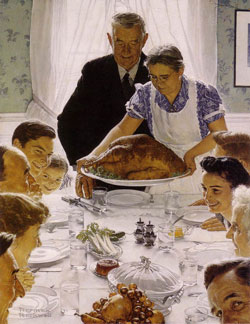The original Thanksgiving narrative is a semi-true tale about a harvest festival between American colonists and native Americans in 1621 in Plymouth, Massachusetts. Reportedly, there was no pumpkin pie, only boiled pumpkin. Meh. The narrative usually stops there, leaving out subsequent massacres and wars.
Anyway, the key storyline was about different people and cultures coming together to celebrate a successful harvest. So that’s the original mythological narrative, the basis for the national holiday.
 The second narrative is the modern notion of Thanksgiving, what I’d call the “Rockwell Narrative”: the idealized version of the modern American Thanksgiving dinner: a big happy family, together around a perfectly-set table, smiling as they prepare to devour a massive roast turkey. Gone is the original idea of different cultures and groups coming together; Rockwell’s Thanksgiving is private.
The second narrative is the modern notion of Thanksgiving, what I’d call the “Rockwell Narrative”: the idealized version of the modern American Thanksgiving dinner: a big happy family, together around a perfectly-set table, smiling as they prepare to devour a massive roast turkey. Gone is the original idea of different cultures and groups coming together; Rockwell’s Thanksgiving is private.
This iconic 1943 image provides the idea of Thanksgiving that advertisers, greeting card companies, and supermarkets want us to try and recreate (with their help). The narrative of the modern Thanksgiving is the celebration of family and abundance.
Growing up, this tidy, white-tablecloth vision of Thanksgiving drove a lot of frenzied preparations in our house: carefully aligning placesettings, using silver utensils, dusting off the China gravy boat, rushing out to various supermarkets, hunting for the “right” rolls to serve in a big, napkin-lined basket. When I’d elbow my way through the crowds at on Thanksgiving morning at Ralphs and Vons, I was one of countless Americans caught up in the annual, frenzied push to recreate Rockwell’s idea of the perfect family meal.
Today, Thanksgiving seems to have evolved to a more indivialized storyline. For many, it’s about “homecoming,” braving the airports, the Interstates, or turnpikes to make it back home for a holiday. For some, the Thanksgiving story is about eating, watching football, and drifting into comatose state. For others, it’s about a less glamorized idea of family: hoping to simply get along and avoid conflict (countless movies and sit-coms dramatize this side of the holiday).
Earlier this year, I wrote about the Passover narrative, and how my take on it has shifted over the years. Thanksgiving shares a lot with Passover: appreciation for one’s history, gratitude for collective good fortune, and a very big meal.
Compared to the mega-commercialization of Christmas, Thanksgiving still seems relatively unspoiled. The basic narrative remains intact: once a year, we try to slow down and celebrate our good fortune with others.
Considering all the other messages we get in our culture, that’s not a bad story to tell.